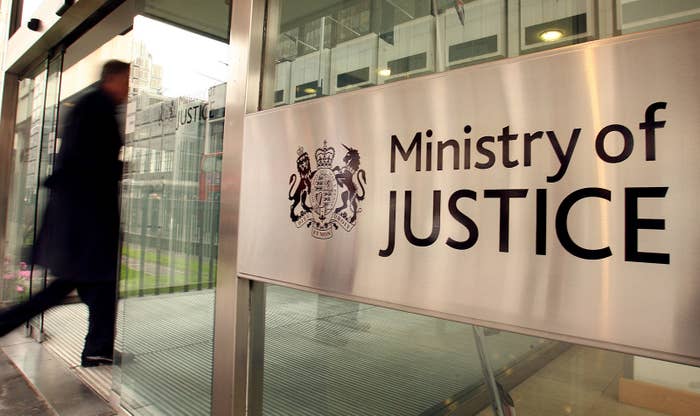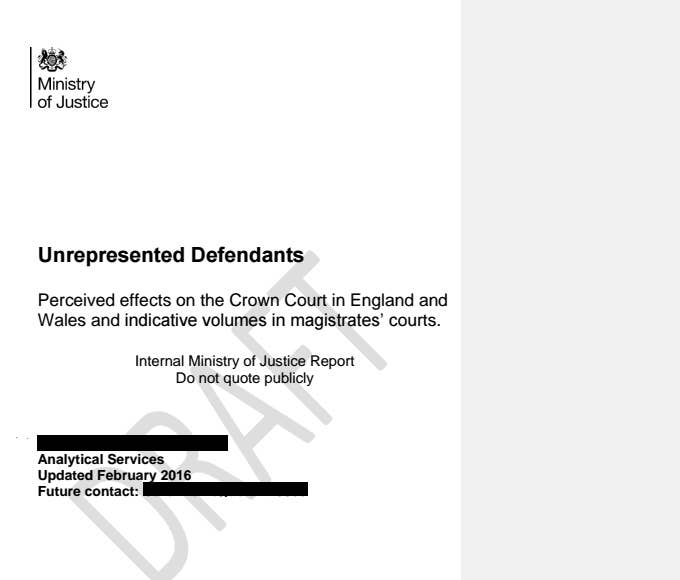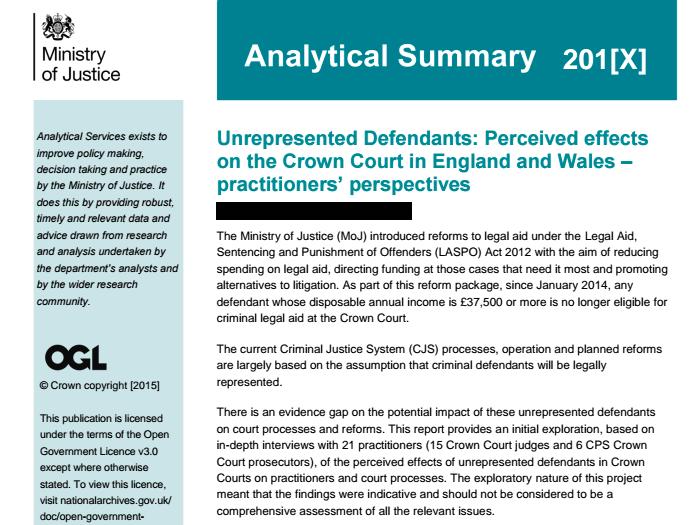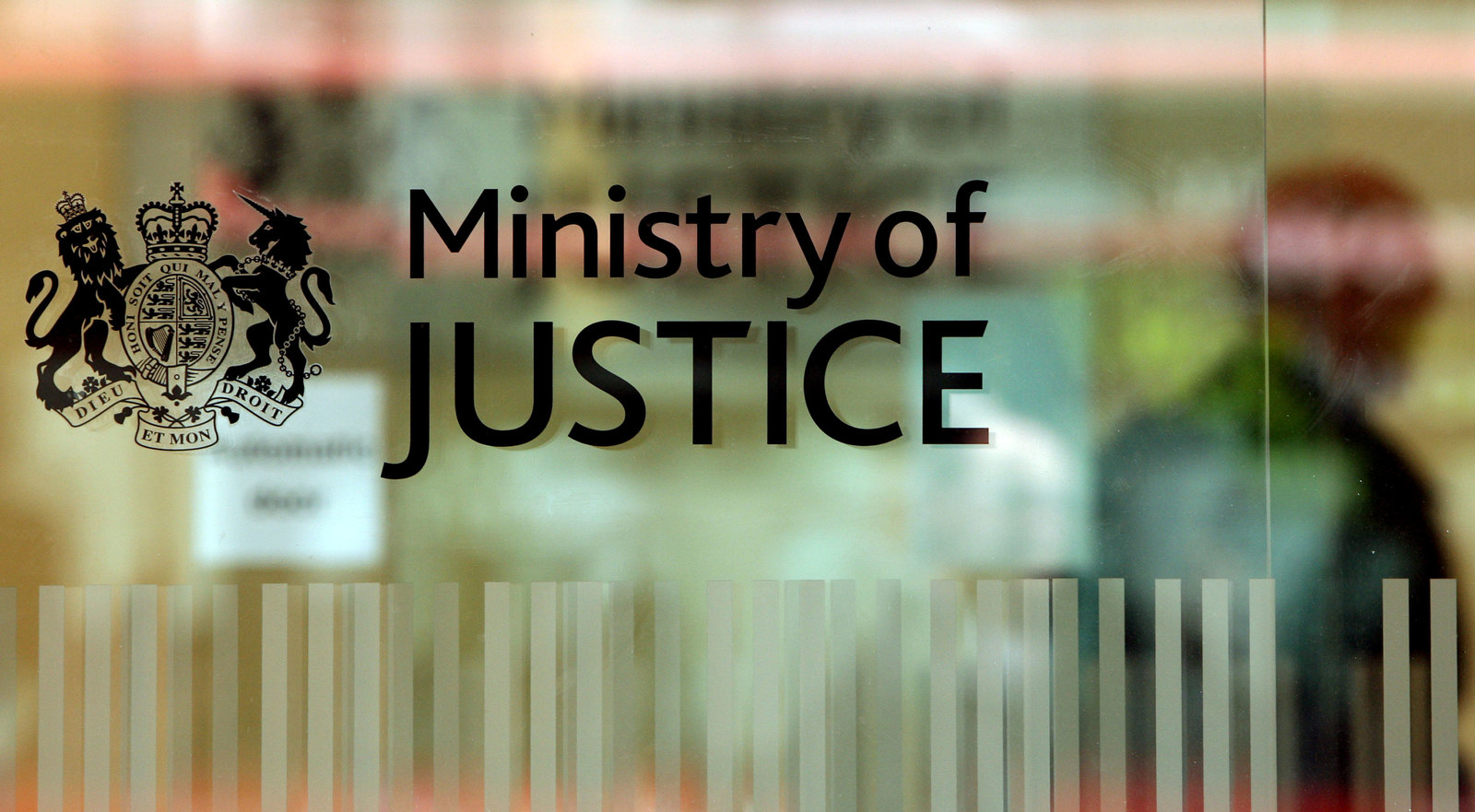
The Ministry of Justice has finally released a report detailing judges' concerns about people facing criminal charges without a lawyer, three weeks after it was leaked to BuzzFeed News following the department's denials that it even existed.
While the report has yet to be published on the MoJ's website, it was sent to BuzzFeed News in response to a complaint to the Information Commissioner. We can now publish it in full here.
The release comes as the MoJ is under criminal investigation over allegations it buried a substantial report it had been ordered to release by the Information Commissioner’s Office (ICO).
Previously, the MoJ had released only a six-page summary of research in response to Freedom of Information requests for a report into unrepresented defendants in crown court. It repeatedly denied that there was a longer version of the report. The summary can be viewed here.
After BuzzFeed News reported the MoJ to the ICO amid serious doubts that this was the full research, the full 36-page-report was leaked to us. The MoJ says this brief summary was the final report and that the leaked document was a draft.
Now we can reveal that even the summary the department released had been edited after it was shown to the Information Commissioner.

The MoJ released a six-page summary with two dates on it – August 2016 and April 2018. But the summary it had shown to the ICO, and which they agreed to release, was seven pages and undated.
After this was pointed out to the ICO, the MoJ said in a letter to BuzzFeed News and others this was an “administrative error” but the last-minute edits downplay the research and make it sound less less authoritative.
Shadow justice secretary Richard Burgon will be questioning the government on its handling of the report in parliament next week when MPs return from recess. He told BuzzFeed News: “The widespread damage the government's deep cuts to legal aid have done won’t be reversed by cherry picking the evidence to avoid political embarrassment.”
The title of the seven-page summary document the MoJ showed the ICO - and said it would release is - “Unrepresented Defendants: Perceived effects on the Crown Court in England and Wales – practitioners’ perspectives”. It can be viewed here.
The title of the summary actually released to BuzzFeed News (available here) was “Exploratory research into unrepresented defendants in the Crown Court in England and Wales – perspectives from a small sample of practitioners”.
By calling the research “exploratory” and saying in the title it was “a small sample of practitioners”, the MoJ appears to have attempted to undermine the authority of the research.
Whole sentences were deleted, such as: “There is an evidence gap on the potential impact of these unrepresented defendants on court processes and reforms.”
A section saying “Several important caveats should be noted when reviewing the findings from this research” is added, and it is noted repeatedly that “The research was very small scale”. Qualitative research, which the MoJ and other government departments conduct all the time, is by definition small scale.
In some cases the meaning of sentences was subtly changed by edits, such as deleting the fact that unrepresented defendants “were more likely to” raise points unrelated to their case and instead saying that they raised unrelated points.

A summary of judges’ general views on unrepresented defendants was changed to make it sound like judges could be expressing something specific about a particular case. A sentence in the summary released to the ICO said: “All the judges interviewed expressed a very strong preference that a defendant facing charges should be represented” was changed to: “All the judges interviewed stated a very strong preference that the defendant facing charges was represented.”
The study was commissioned by the government to review the impact of cuts to legal aid made in the 2012 Legal Aid, Sentencing and Punishment of Offenders Act (LASPO) and was based on in-depth interviews with 15 crown court judges and six prosecutors.
In a story published on 8 May, BuzzFeed News revealed the existence of the 36-page report which had leaked after being buried by the MoJ.
On Thursday, more than three weeks later, the department released the document itself. In a letter alongside the release of the document, the MoJ insists that the substantial report was an "early draft", arguing that the summary was made because of doubts over the quality of the research.
But researchers and lawyers who have now been shown the report by BuzzFeed News say they have no concerns about its quality and that it reflects a trend that is being seen in courts across Britain.
Penelope Gibbs, director of Transform Justice, who has conducted her own research into the experience of unrepresented defendants – and was among those who appealed to the ICO to release the report – said: “I look at MoJ research the whole time and it’s as good as lots of it. It’s a qualitative research report and it says what it is at the beginning. What is a mystery is why they were so adamant that they wouldn’t publish it.”
She added: “I can see no quality problems with the original report. It is what it is: it’s a qualitative report with some very interesting evidence which frankly the MoJ should follow up.”
Gibbs added: “I’m still not quite sure why the MoJ has fought tooth and nail to keep this report secret for two years. Perhaps it’s because it questions the whole basis for restricting criminal legal aid.”
The MoJ insists that the number of people facing criminal charges without lawyers has broadly stayed the same since Laspo and that those without lawyers choose to go it alone. It points to the fact that 99% of criminal legal aid applications are accepted, but experts argue that people told they will no longer qualify are very unlikely to make an application.
The MoJ's own data shows that last year more than 6,000 people appeared without a lawyer or had unknown representation at their first hearing – that’s 7% of all defendants. In 2013 this proportion was 5%.
Angela Rafferty QC, chair of the Criminal Bar Association, said barristers had been seeing signs of the rise of unrepresented defendants since Laspo.
She said: “Members of the Criminal Bar Association have for several years been reporting back on a sense from daily Court life that the numbers of self represented defendants were on the rise not through choice but necessity. The threshold for criminal legal aid has been cut so severely, leaving a material gap between those who are denied legal aid and those who can in reality afford to fund their own independent legally qualified advocates."
On the MoJ’s handling of its research, Rafferty said: “It is essential that there is absolute transparency when it comes to the relaying of key pieces of research into the criminal justice system especially those aspects which may concern the poor and the vulnerable who may risk not having equal access to justice.
“Feedback from members of the judiciary and other key users of the criminal justice system on the effects of LASPO and any increase in self-representation, needs to be shared in full so that a proper assessment can be made about court time both in economic terms and whether a core purpose is being delivered - that justice is actually being delivered to those most in need.”

The letter from the the MoJ’s disclosure team also appears to attempt to discredit the report. “The draft report shows that a substantial amount of information relating to magistrates’ courts was discarded during the quality assurance process, as it was not academically robust enough to be used in policy development,” it says.
The section on magistrates courts represents just four pages of the substantial report and one part of the appendix.
Testimony from crown court judges and prosecutors – the key component of the research – were also excised from the summary, as were most of the policy recommendations that risked undoing the legal aid cuts introduced by Laspo.
The study acknowledges that the magistrates data is a snapshot and that some missing data means that percentages had to be calculated using just over 1,000 cases from three, rather than five magistrates courts. It appears to underestimate the scale of the problem, coming up with a figure of 13% of people unrepresented in magistrates court.
A recent survey of magistrates for BuzzFeed News found that 30% of all criminal defendants they saw at their last session had no lawyer, up from 24% in 2014.
Greg Callus, a barrister who also applied for the release of the research and appealed to the Information Commissioner when it was turned down, said: “The MoJ's handling of this FOI request has been nothing short of disastrous.”
He added: “The requests were for a simple unpublished report, mentioned in Parliament. It should have been relatively easy to identify the information in question.
"Add to that the scale of obfuscation and delay (the failure to conduct an internal review, the failure to release anything by the deadline for compliance with the Decision Notice, the releasing of a 6-page summary that transpired to be an edited version of the 7-page summary), then the abject failure of the MoJ to reveal the existence of the full 36-page report even to the ICO until after it was leaked to BuzzFeed, begins to suggest that deliberate efforts on the part of the MoJ to avoid its transparency obligations is not such an implausible explanation.
“Assuming they were aware of the full report, the suggestion that it wasn't within the scope of the FOIA requests, and thus didn't need to be shown to the ICO, is risible. I don't think a person acting in good faith could possibly come to that conclusion: it would be perverse.”
Commenting on the release of a second edited summary, Callus said: “If the argument is that the 36-pages was a draft, and the 7-page version (shown to the ICO) was the actual finished high-quality report, why was there a new 6-page version being prepared for later publication, when the ICO had already ordered the 7-pager released? And is it coincidence that the edited 6-pager was sent to me by mistake, rather than the 7-pager? The suggestion that the issue was the quality of the research is neither here nor there: FOIA doesn't only apply to high-quality information.
“None of the explanations offered by the MoJ to date stands up to much scrutiny, and they will need to do a lot better in justifying their handling of this matter now that the ICO is going to conduct a full investigation."
In a statement to BuzzFeed News, an MoJ spokesperson said: “The ICO is looking into a complaint about this FOI and it would be inappropriate to comment further while that is ongoing.”
An ICO spokesperson said: “We are continuing to make enquiries into a complaint about an FOI request in relation to the Ministry of Justice.”

